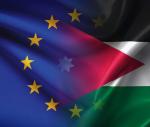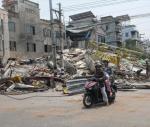You are here
A more complicated situation
Sep 27,2017 - Last updated at Sep 27,2017
Whenever the US attempts or effects “regime change”, disaster follows.
North Korea is the latest country where Washington would like to oust the leadership, perhaps because its ruler, Kim Jong-un, called Donald Trump a “dotard”, a senile old man, after he dubbed Kim “rocket man”.
Being referred to as a “dotard” prompted Trump to retaliate by tweeting that the North Korean leadership “won’t be around much longer”.
In our region, the two Bush presidents fostered “regime change” in Iraq, with deadly and dire consequences that continue to roil Iraq and its neighbours.
After driving Iraqi forces from Kuwait and laying waste to Iraqi power plants and infrastructure in 1991, George H.W. Bush urged Iraqi Kurds and Shiites to revolt against Baghdad and bring down the government of Saddam Hussein.
The insurrection was put down by the Iraqi army at great cost to both communities and he remained in power.
Washington responded by declaring Iraq’s four northern provinces, Erbil, Dohuk, Halabja and Suleimaniya, a “safe haven” for the Kurds. This action had the effect of dividing Iraq into Kurdish and Arab regions, launching a first stage in the process of partition and disintegration.
The “safe haven” provided the long secessionist Iraqi Kurds with an opportunity to build self-rule with the aim of realising their decades-old dream of independence.
George W. Bush, son of the earlier Bush, propelled the process further when he declared war on Iraq in 2003, defeated and dismantled the Iraqi army, and ousted Saddam Hussein.
The occupation regime imposed by Washington drafted a constitution in 2005 that gave the Kurds near independence in the Kurdish-majority provinces and classified as “disputed territories” districts of four provinces that have Arab, Turkmen and other communities.
The Kurds included in the latest referendum the “disputed territories”, sharpening Baghdad’s protests and leading to clashes between Kurdish peshmerga and Turkmen militiamen.
Iraqi Kurdish separatism has spurred Turkish, Iranian and Syrian Kurds to adopt a similar course of action.
The Turkish Kurds have renewed their fight for self-determination, begun in 1984, when the leftist Kurdistan Workers’ Party (PKK) launched an armed revolt against the Turkish state.
Iran also has a crop of Kurdish separatists who belong to the Kurdistan Free Life Party (PJAK), founded in 2004 as an offshoot of the PKK.
PJAK calls for the liberation of parts of northwestern Iran, which border Iraq and Turkey and which the Kurds call “Eastern Kurdistan”.
PJAK, which seeks independence, has an office and a military presence in the Iraqi Kurdish region.
Syrian Kurds refer to Kurdish-inhabited areas in northern Syria as “Rojava”. It is dominated by the PPK-linked Kurdish Democratic Union Party (PYD) and its military wing, the US-backed People’s Protection Units (YPG).
So far, Syria’s Kurds have demanded autonomy in a federated state structure rather than independence. Damascus is prepared to negotiate. It remains to be seen how Washington intends to use the YPG to further US, rather than Kurdish, interests in Syria.
Having helped the Kurds to secure “Rojava”, the US is deploying the YPG to liberate Arab city of Raqqa, the capital of Daesh, and seize strategic territory in the eastern province of Deir Ezzor, well beyond the Kurdish area.
There are risks of clashes with the Syrian army, supported by Russian airpower and Iranian ground forces.
While the political impetus to the Kurdish movement is supplied by the Iraqi Kurds, military muscle is provided by the PKK.
The US has repeatedly used the Kurds against regimes it does not like in Iraq and Iran, and now in Syria.
The Kurds always agree to US backing in the expectation that it will lead to the realisation of their dream of statehood, but the Kurds have always been abandoned by the US and its allies, including Israel, when they lost their usefulness.
The Iraqi Kurdish referendum was undertaken against Washington’s advice. The US, rightly, fears that the vote could lead to Arab-Kurdish and Turkmen-Kurdish violence in the north of the country at a time the Iraqi army and allied militias are carrying out the final stages of the campaign to defeat Daesh.
The referendum will also, ineluctably, weaken the weak Iraqi government, which is propped up by both Iran and the US, and undermine Iraqi national unity and sovereignty.
For Iran’s government, the country’s restive Kurds are a minor threat and a nuisance, as they constitute only 7-10 per cent of the country’s population.
The Kurds can be a greater problem in Syria, where, although only 9 per cent, they are challenging the government and the army during a major conflict.
The Kurds of Iraq, 17 per cent, have been in violent revolt for decades, while the Turkish Kurds are a solid 25 per cent of the population and determined to secure self-rule from an increasingly repressive Ankara, which is determined to both assert Turkey’s ethnic identity and promote conservative religious practices.
Having launched Iraq’s Kurds on their latest campaign to secure independence with the 1991 “safe haven”, the US is now caught between the Kurdish capital, Erbil, and Baghdad, and is having to deal with the aspirations of the region’s other Kurdish communities.
Furthermore, the situation is complicated. The PKK is branded by Turkey and the US as a “terrorist” organisation; PJAK, a group that could be used to annoy Tehran, is also deemed “terrorist”; and the Syrian Kurds, considered “terrorists” by Turkey, have been encouraged by the US to stretch their military resources beyond their possibilities, and are certain to attract a harsh response from Damascus and its allies, Moscow and Tehran, a response that could lead to clashes between the US and Russia.
Ultimately, the Kurds, who have to live with Turkey, Iraq and Iran as neighbours, are ill advised to alienate them and elicit violent reactions.















